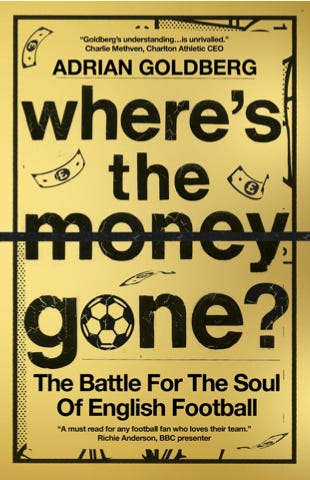The UK’s Complicity in Saudi Sportswashing
Saudi Arabia now dines at the top table of world football. Its shocking human rights record and the murder of Jamal Khashoggi have taken a back seat to its vast wealth, as Adrian Goldberg explains.
Saudi Arabia is set to host the 2034 World Cup, and its Pro League is busy raiding top European clubs for talent, including the likes of Christiano Ronaldo. The country’s shocking human rights record under Crown Prince Mohammed bin Salman and the murder of Saudi journalist Jamal Khashoggi have taken a back seat to the oil state’s vast wealth, as Adrian Goldberg explains in this edited extract from his new book, Where’s The Money Gone? The Battle for the Soul of English Football.
Come and hear Adrian Goldberg in conversation with Niall Cooper (Chief Executive of football advocacy group Fair Game) and Charlie Methven (former Sunderland AFC director now running Mount Pleasant FC in Jamaica and Mons FC on Belgium) at the book launch on 16 September. Details below.
When Saudi Arabia’s Public Investment Fund (PIF) initially tried to buy Newcastle United in 2020, the Premier League rejected the takeover, recognising the PIF as an arm of the Saudi Government.
Its objections to the Saudi takeover had nothing to do with government ownership per se, however. The key issue was TV rights.
In the Gulf region, the Premier League had sold these to beIN Sports, a broadcaster based in Qatar, the Government of which was locked in a bitter diplomatic rivalry with the Saudis.
In 2017, Saudi Arabia severed all diplomatic ties with the Qataris and banned the sale of beIN receivers as part of a wider economic blockade. The Government in Riyadh promoted a rival service called beoutQ, which was, in effect, a state-sanctioned illegal streaming service.
This bitter piracy row was playing out in the eight months during which the PIF’s possible purchase of Newcastle was being reviewed by the Premier League.
With the decision still up in the air, the Saudi Public Investment Fund withdrew its offer to buy Newcastle, blaming the “unforeseeably prolonged process”. In a statement, the PIF sought to distance itself from the Government of Crown Prince Mohammed bin Salman (MbS), describing itself as “an autonomous and purely commercial investor”.
What was going on behind the scenes paints an altogether different picture.
According to the Daily Mail, MbS was “enraged” by the collapse of the deal. It quoted a text he had sent to then Prime Minister Boris Johnson in June 2020, saying that “we expect the English Premier League to reconsider and correct its wrong conclusion” – even though, at that stage, no decision had been announced.
In October 2021, the deal was back on again.
What happened in the intervening 16 months is the subject of much intrigue and speculation.
Premier League chief executive Richard Masters said there was “no pressure applied” on him by ministers to approve the takeover and Johnson insisted that “these are commercial matters for the parties concerned”. He told Parliament that “the Government was not involved at any point” in the takeover.
Correspondence released under Freedom of Information to The Athletic suggests that, as with many of Johnson’s statements, this may require a flexible interpretation of the truth.
These emails showed that the British Ambassador to Saudi Arabia, Neil Crompton, discussed the takeover with PIF officials, although large chunks of their conversation were redacted. Full disclosure, it was said, “could potentially damage the bilateral relationship between the UK and Saudi Arabia”.
WhatsApp messages leaked in 2024 also suggested that Crompton had talked directly with MbS about the issue.
The then Middle East and North Africa Minister James Cleverley also requested an update on the bid when talking to the Saudi Ambassador to the UK.
A breathtaking compromise was finally brokered in October 2021.
The Premier League said it had “received legally binding assurances that the Kingdom of Saudi Arabia will not control Newcastle United Football Club”. The precise nature of those “legally binding assurances” has never been revealed or the consequences for the PIF if they are broken.
The idea that there is somehow a separation between the Public Investment Fund and the absolute monarch who chairs it was contradicted by its own lawyers in a US court hearing investigating Saudi disruption of the professional golf tour in 2022. The PIF’s legal team argued that it did not need to hand over evidence because it was protected by a federal law which protects foreign leaders and government from prosecution in America.
In other words, it was demanding protection as a government entity in the US, while insisting in the UK that it was somehow divorced from the Saudi leadership.
Nevertheless, the fudge did its job.
By accepting that the PIF was operating at arm’s length from the Saudi Government, the Premier League was absolved of its responsibility for putting MbS through its potentially problematic owners and directors test.
No doubt it was relieved. Had it turned down a bidder believed by the CIA to have blood on his hands over the killing of Saudi journalist Jamal Khashoggi, it had the potential to cause a full-blown diplomatic incident.
Adrian Goldberg will be in conversation with Niall Cooper (Chief Executive of football advocacy group Fair Game) and Charlie Methven (former Sunderland AFC director now running Mount Pleasant FC in Jamaica and Mons FC on Belgium) at the book launch on 16th September from 6.30-8.30 pm at Vout-O-Reenee’s, The Crypt, 30 Prescot Street, London, E1 8BB.
Entry is free, but please RSVP to rachael@bylinetimes.com
Where’s The Money Gone? The Battle for the Soul of English Football is published by Byline Books. This extract appears in edition #77 of Byline Times.




